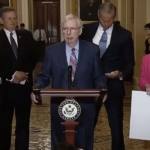The purpose of this column is to make the reader aware of current events in politics and media and to explain the facts from both sides to get a real picture of the argument instead of having message skewed through mainstream media. This is one man trying to relate to college students the hot issues of the world so as to make the information for accessible. The column will present an opinion but will do the it’s best to only use opinions supported by lines of evidence.

Patrick Olds
– Opinions Editor –
![]()
George W. Bush’s foreign policy legacy has a chance to be a great one.
Now, as readers of this column recover from the collective gasp that resulted from this absurd statement, it should wander into the minds of the curious as to why that is.
Former President Bush was dubbed as a moron and an ignoramus by elitist intellectuals, a theory that was sold to the masses as fact by the media.
It’s become taboo to even mention the former president’s name.
Let’s go a step further and state that the war in Iraq, although costly and mishandled at times, will be seen as a long-term success and the point at which the fountain of freedom was tapped for the entire Middle East.
Don’t forget that there were, in fact, two main objectives for the war in Iraq. One, everyone will remember, was to rid Saddam Hussein of weapons of mass destruction. The second objective, that the sellers (media) often conveniently forget, was to show that democracy can exist in the Middle East.
Critics might roll their eyes at the idea that Bush’s main objective was to free the people of Iraq, and that’s fine. Democracy is built on debate.
Consider that the nation’s military operations, for the most part, are used to promote the policy interests of the United States. The military is the blunt instrument of diplomacy. Some may think oil was our policy interest that somehow Dick Cheney would profit from a future Halliburton monopoly over Iraq’s oil fields, when, in reality, the oil fields have been contracted out to foreign companies by the Iraqis.
The more important foreign policy interest of the United States is to promote freedom and governments that operate under the collective will of the people instead of tyrants oppressing their people.
In 2003, when Operation Iraqi Freedom commenced, Afghanistan was looking more secure by the day and building a good foundation for the future. With Afghanistan gaining its freedom to the east of Iran, it made sense to promote democracy in Iraq through regime change. As we all know now, the situation in Afghanistan has become very difficult with Taliban resistance sprouting up throughout the country lately, but the strategy overall was to introduce democracy and its practice to people who hadn’t seen it in 80-plus years.
Intellectuals such as Fareed Zakaria wrote off the idea that the Middle East was ready for democracy. Zakaria wrote an editorial for The Guardian newspaper in 2003 proclaiming, “Iraq is not ready for democracy.”
As we’ve seen with the revolutions in Egypt, Libya and now Syria, the people of the Middle East have seen democracy work quite well in its beginning stages in Iraq. Turnouts of approximately 90 percent for elections in Iraq, in the face of threats of violence and death, show the people of Iraq and the entire Middle East that the people do want democracy.
No one wants to give credit to Bush now, but credit to him will be hard to dispute if, in the near to long term, countries begin to form governments that are representative of their people.
Americans will have to learn to give credit where credit is due.
If not for Bush’s faith in people’s right to be free, we might not be seeing these revolts that are spreading like wildfire across the Middle East.










